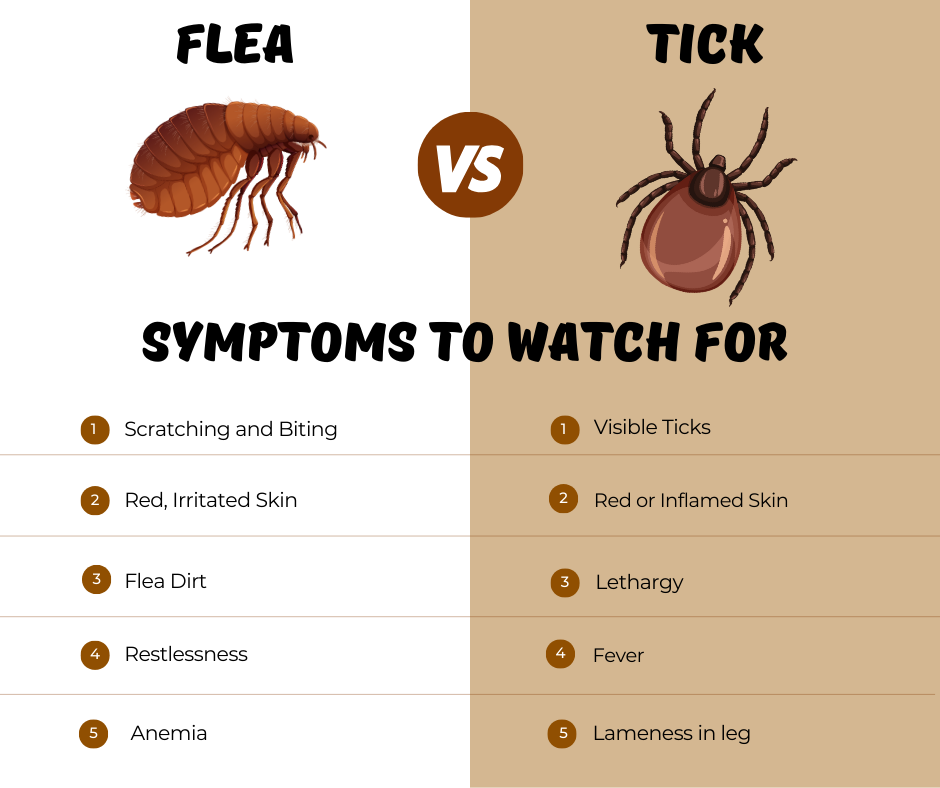
Protecting your Pet from Fleas and Ticks
As pet owners, we're always on guard against threats to our furry friends' health. Two common culprits that often raise concern are fleas and ticks. But which of these tiny terrors poses a greater risk? Dr. Greg Paplawsky, here at Cascade Hospital for Animals, provides expert insights on this itchy issue.
Understanding the Enemy
 First, it's crucial to understand how these parasites differ. Dr. Paplawsky explains, "Fleas live on the pet's hair coat and reproduce in the pet's environment. Ticks typically get on pets from the outdoors, live on the pet for a short time then drop off to continue the life cycle."
First, it's crucial to understand how these parasites differ. Dr. Paplawsky explains, "Fleas live on the pet's hair coat and reproduce in the pet's environment. Ticks typically get on pets from the outdoors, live on the pet for a short time then drop off to continue the life cycle."
This distinction is important because it affects how we approach prevention and treatment. Fleas are wingless insects that feed on the blood of mammals and birds, thriving in warm and humid environments. They can jump great distances, making it easy for them to move from host to host. Ticks, on the other hand, are arachnids that attach themselves to the skin of their host to feed on blood. They are often found in wooded or grassy areas and can latch onto pets when they venture outdoors.
Health Risks: More Than Just a Nuisance
While both parasites can cause discomfort, their potential for harm goes beyond mere irritation.
"Fleas can cause allergic reactions, itchy skin, and can pass on parasitic worms to pets if they are ingested," Dr. Paplawsky notes. Flea bites can lead to flea allergy dermatitis, a hypersensitive reaction that results in intense itching and skin infections. Additionally, fleas are carriers of tapeworms, which can be transmitted to pets if they ingest an infected flea during grooming.
"Ticks, on the other hand, can pass diseases while they feed, such as Lyme disease, Ehrlichia, and Rocky Mountain Spotted Fever, among others." These diseases can cause serious health issues in pets, including fever, lethargy, joint pain, and, in severe cases, organ damage. Lyme disease, for example, is a bacterial infection that can lead to chronic arthritis and kidney disease if left untreated.
When asked which parasite typically causes more severe symptoms or long-term health issues, Dr. Paplawsky's response is nuanced: "Certainly ticks can cause more long-term health issues if they are not addressed, but a dog with severe flea allergic dermatitis can certainly be very uncomfortable. Small puppies and kittens can actually become quite anemic from a heavy flea burden." Fleas can consume enough blood to cause anemia, particularly in young, old, or sick animals, which can be life-threatening if not treated promptly.
Prevention: The Best Medicine
Given the potential risks, prevention is key. Dr. Paplawsky recommends, "Keeping your pet on a monthly chewable or topical flea and tick preventative is the best way to stop the effects and prevent infestations. All pets in the house should be on a preventative." There are various products available, including oral medications, topical treatments, and collars that can effectively repel and kill fleas and ticks. It is essential to consult with your veterinarian to choose the most suitable and safe option for your pet.
Spotting the problem

Vigilance is crucial in catching infestations early. "Usually owners can find ticks on the pet once they enlarge from feeding," Dr. Paplawsky advises. Ticks can be felt as small bumps on your pet's skin, and it's important to check areas like the ears, neck, and between the toes where ticks often attach. "Sometimes fleas can be seen running around under the hair coat." Fleas are more difficult to detect due to their small size and quick movements, but you might notice flea dirt (tiny black specks of flea excrement) on your pet's skin or bedding.
 Debunking Myths
Debunking Myths
There are some common misconceptions about fleas and ticks that Dr. Paplawsky wants to clear up. "One of the misconceptions is that fleas can't survive the winter. Fleas are very happy to complete their life cycle all year round in a nice warm house. There is no 'off season' for fleas," he states. Flea eggs, larvae, and pupae can remain dormant in carpets, furniture, and pet bedding, hatching when conditions become favorable. "For ticks, they become a threat as soon as the temperatures get above freezing. So if there is a stretch of above-freezing weather in February, ticks are active."
Seasonal and Regional Variations
While flea and tick activity can vary by region, Dr. Paplawsky notes that generally, "Fleas and ticks are more active in warmer weather and pets tend to be outside more in the warmer weather so their exposure increases." However, regions with mild winters may see year-round activity. It's important to maintain preventive measures regardless of the season to protect your pet from these parasites.
Human Health Concerns

Pet owners might worry about their own health when it comes to these parasites. Dr. Paplawsky offers some reassurance: "Fleas will choose dogs and cats over people if they have a choice. The ticks on the pets do not cause a direct threat to people, but ticks that get onto humans can certainly pass on diseases such as Lyme disease." While it's less common, fleas can bite humans, causing itching and discomfort. Ticks can attach to humans and transmit diseases, so it's crucial to check yourself and your pets for ticks after spending time outdoors.
While both fleas and ticks pose significant health risks to our pets, ticks generally have the potential for more severe long-term consequences. However, a severe flea infestation can also cause serious discomfort and health issues, especially in young or small animals. The best approach is comprehensive prevention against both parasites, regular check-ups, and prompt treatment if an infestation occurs.
Remember, your veterinarian is your best resource for keeping your pet healthy and parasite-free. Don't hesitate to reach out to them with any concerns about fleas, ticks, or other pet health issues. Keeping your pet on a year-round preventative regimen, staying vigilant for signs of infestation, and maintaining a clean environment are key steps to ensuring your pet's well-being.
Located in the heart of West Michigan, serving Ada, Cascade, Forest Hills, and the greater Grand Rapids area, Cascade Hospital for Animals and Breton Village Animal Clinic are trusted havens for vet care. Reach out today to schedule a comprehensive physical examination for your pet.



